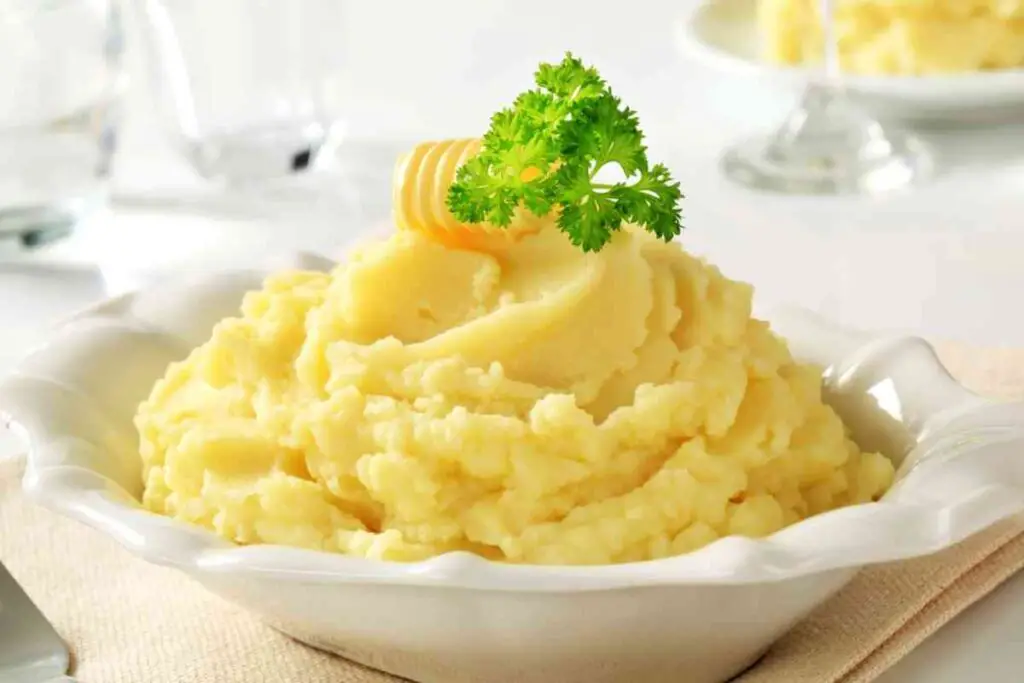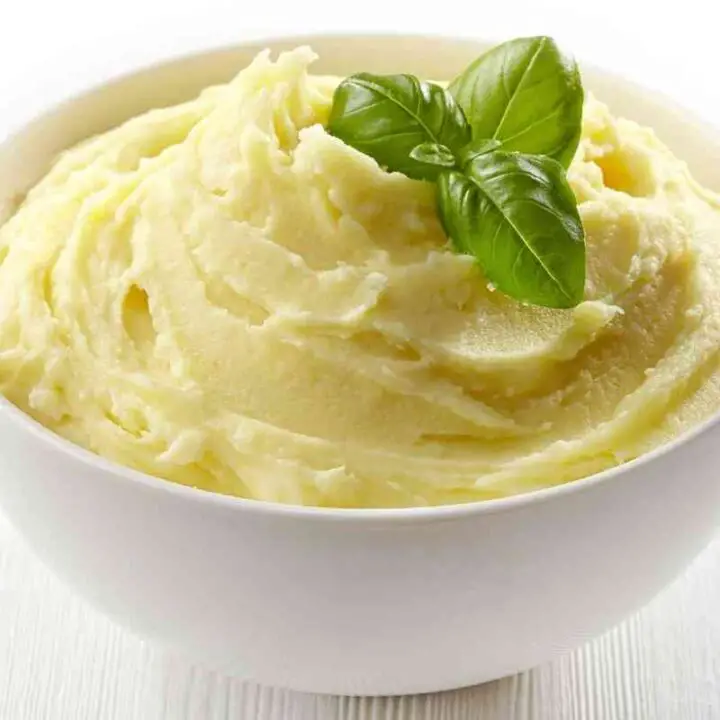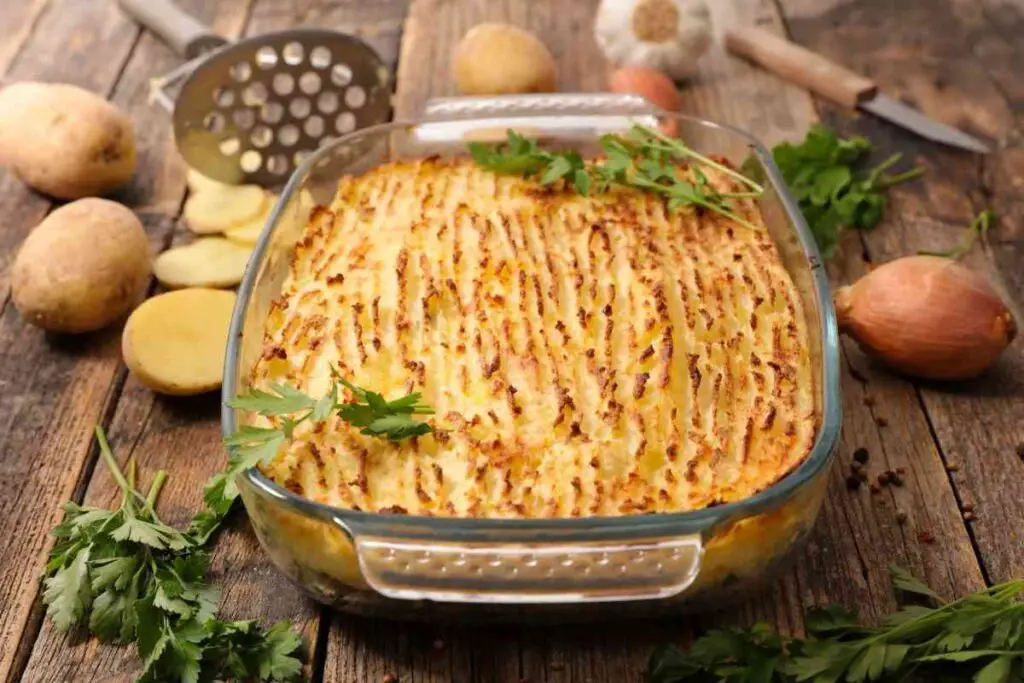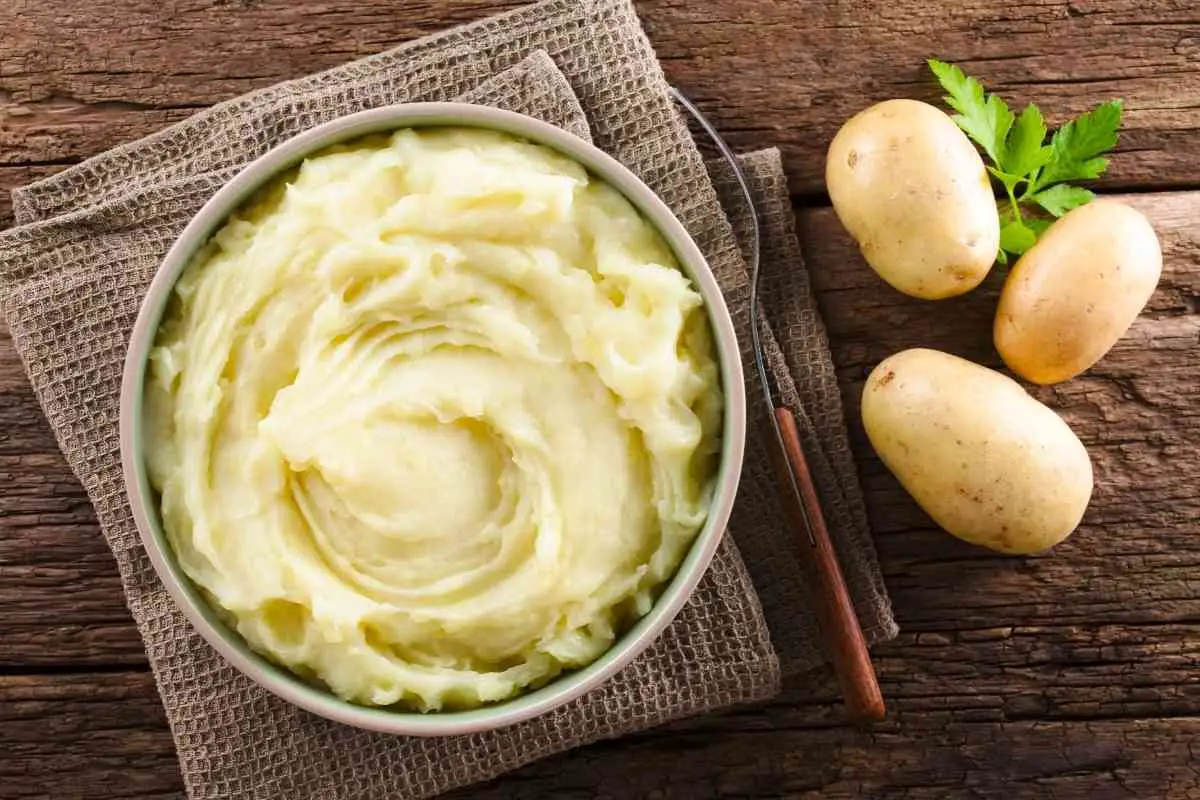Mashed potatoes are a classic dish that is popular all over the world. They are easy to make and can be enjoyed with many different toppings and flavors. But once they are made, how long do they last? Will they spoil if you don’t eat them right away?
In this blog post, we will answer all of your questions about mashed potatoes. We will discuss how long they last, how to store them, and some tips for reheating them. So whether you are making mashed potatoes for the first time or want to know more about how to keep them fresh, read on!
What are Mashed Potatoes, and Why are They so Popular?
Potato mash, often known as mashed potatoes, is a creamy and delectable side dish. It’s produced by boiling potatoes until soft, then mash them with butter, milk, etc.
It’s usually served with meat or veggies as a side dish. Smashed potatoes are potatoes that have just been roughly mashed. There are frozen mashed potatoes and dehydrated quick mashed potatoes available. Other dishes that include mashed potatoes are dumplings and gnocchi.
Mashed potatoes are so popular because they taste good, are easy to make, and are very healthy. Mashed potatoes are good for your health since they are high in potassium and vitamin B-6.
Potassium fuels the nerves and muscles, allowing you to contract your muscles, and it also aids in the maintenance of the body’s fluid equilibrium. Potassium helps lower blood pressure and lessens salt sensitivity in the body, so eating mashed potatoes may be especially beneficial for people with high blood pressure.
Mashed potatoes are also high in vitamin B6, often known as pyridoxine. Vitamin B-6 aids metabolism and helps the body manufacture neurotransmitters, and regulates the immune system to keep one healthy.

How Do You Make Mashed Potatoes?
Mashed potatoes are one of the most versatile side dishes out there. You can add almost anything to them, and they’ll be delicious. But, sometimes, it can be difficult to make them just right. This guide will show you how to make perfect mashed potatoes every time.
Ingredients
- 1 cup milk
- 2 pounds baking potatoes, peeled and quartered
- 2 tablespoons butter
- Salt and pepper to taste
How to Make
- Boil salted water in a large pot—Cook for 15 minutes, or until potatoes are cooked but still firm.
- Melt the butter in a small pot with the milk over low heat.
- Blend the milk mixture into the potatoes with a potato masher or an electric beater until smooth and creamy.
- Season to taste with salt and pepper.

Mashed Potatoes
Ingredients
- 1 cup milk
- 2 pounds baking potatoes, peeled and quartered
- 2 tablespoons butter
- Salt and pepper to taste
Instructions
- Boil salted water in a large pot—Cook for 15 minutes, or until potatoes are cooked but still firm.
- Melt the butter in a small pot with the milk over low heat.
- Blend the milk mixture into the potatoes with a potato masher or an electric beater until smooth and creamy.
- Season to taste with salt and pepper.
How Long do Mashed Potatoes Last Once They are Made?
Mashed potatoes are a dish that is best enjoyed fresh. When stored in a sealed container and placed inside the fridge within two hours of cooking, they’re edible for no more than four days (brought down from the heat).
Mashed potatoes can remain almost indefinitely in the freezer; but, they’re best eaten within a month of storage because that’s when they’ll taste closest to their original self without any additional fortification while thawing.
No matter the type of cook you are, it is inevitable to have leftovers at one point or the other. Mashed potatoes can be stored in the refrigerator but not on the shelf to avoid waste. Dangerous germs can quickly develop within a potato as it cools, posing a health risk if eaten.
How Can You Store Mashed Potatoes to Make Them Last Longer?
Storing in the Refrigerator
When preserving leftover mashed potatoes in the refrigerator, ensure they’re kept in an airtight container. Using an airtight container guarantees that the contamination of the potatoes will not spread to other goods in the refrigerator.
Using an airtight container or a sealed container will also prevent the potatoes from absorbing other odors inside the refrigerator and drying out. The moisture will be maintained inside of the container instead.
Whatever airtight container you choose to put the mashed potatoes in, make sure it’s broad and shallow. This kind of container will ensure that the food cools uniformly in the refrigerator and that there are no warm areas to cause the mashed potatoes to spoil sooner than they should.
Storing in the Freezer
Another way to store mashed potatoes for a more extended period is by freezing them. This is another excellent storage option, and because the potatoes are already somewhat mushy, the texture of the potatoes is unlikely to change. You’re set to go as long as you have enough storage space and freezer bags or containers to put them in.
It would help if you separated the leftover mashed potatoes into separate parts before freezing them. Instead of thawing the entire set of potatoes, you can take out as many parts as needed when it’s time to reheat them.
After portioning the leftover mashed potatoes into freezer bags or freezer-safe containers, seal them and store them in the freezer. After this is done, you’ll have up to a year to defrost and consume your potatoes. It is advisable to consume it within a month to retain the freshness.
Before freezing leftover mashed potatoes, ensure they are no longer hot, meaning they have cooled to room temperature or lower. If you place the leftover mashed potatoes in the freezer while they’re still hot or warm, it may cause other things in the freezer to defrost. Raising the freezer’s total temperature is the last thing you want to happen, and it defeats the purpose of trying to store the food in the first place.
Tips for Reheating Mashed Potatoes
Reheating mashed potatoes can seem like a daunting task, but you’ll be able to do it perfectly every time with these tips. Whether reheating them in the microwave or on the stovetop, these tips will help your mashed potatoes retain their delicious flavor and texture. Follow these tips, and you’ll have perfect reheated mashed potatoes in no time!
Transfer the Leftover Mashed Potatoes to a Baking Dish
By heating the leftover mashed potatoes in an equal layer, they will warm up faster and dry out less.
Increase the Amount of Cream and Butter
When it comes to reheating leftovers, more moisture and butter are key elements. Use half-and-half or butter and broth to heat the leftover mashed potatoes.
Cover and Reheat Slowly
Cover the baking dish and place it in a 350°F oven with any turkey leftovers you’re reheating if there are any. (It’ll take approximately the same amount of time for both.) If everybody is sitting down for seconds simultaneously, this is quite useful.
How to Tell if Your Mashed Potatoes Have Gone Bad
If you’ve ever made mashed potatoes, chances are you know that they can go bad pretty quickly. But how can you tell if they’ve gone bad? Here are tips to know if your mashed potatoes have gone bad.
Smell
If the mashed potatoes smell horrible, they will usually look bad, although this isn’t always the case. The mashed potatoes may appear to be OK to eat on the surface, but you should discard them if they have a foul odor.
This smell will come considerably faster if you have already added any dairy ingredients to the mashed potatoes.
Color
If your mashed potatoes are an off-white or gray color, that’s usually a sign that they’ve gone bad. It doesn’t necessarily mean the same thing if you used whole milk.
Texture
While it may be tempting to eat some of the leftover mashed potatoes if they’re rather mushy and have lost their form, you should still discard them. If the mashed potatoes have chunks missing, that’s also a sign they’ve gone bad and should not be consumed.
Appearance
When mashed potatoes are fresh, they may get a somewhat golden color if you’ve added dairy ingredients. If the mashed potatoes have moldy patches, a shiny appearance in some areas, or patches of dry bits, they’ve gone bad.
Taste
If the mashed potatoes taste weird while you’re eating them, you should stop eating them immediately. If you are uncertain about the look or smell of the mashed potatoes, you can taste them to determine if they are acceptable, but this is not advised. If they have a sour flavor, toss them out right away.
Can Adding Milk and Butter Make the Mashed Potatoes Go Bad Quickly?
If you don’t add any dairy products to your mashed potatoes, they will keep for longer. If they contain any dairy products, such as milk, butter, or cheese, you should put them in the refrigerator as quickly as possible.
While adding dairy products like butter or milk can improve the taste of the mashed potatoes, it will also cause them to spoil sooner than they otherwise would. You’re adding extra proteins and lipids to the mashed potatoes, which aren’t thermally stable or stable at high temperatures.
Variations of Mashed Potatoes
Try something with a lot of flavor and delicious ingredients instead of the same old lumpy, bland potatoes. At dinner or any gathering, a mashed potato dish variant will make you the real deal.
Mexican Mashed Potatoes
Mashed potatoes, bell peppers, jalapenos, onion, and green chiles are combined in this dish. They’ll warm up beautifully the next day.
Fried Mashed Potato and Gravy Bombs
It’s impossible to have mashed potatoes without gravy, and this dish gives the best of both worlds in every bite. Make these and they’ll be a tremendous hit.
Jalapeno Garlic Mashed Potatoes
These mashed potatoes are sure to please if you like spicy things. The jalapeno is perfectly balanced with the garlic. These creamy garlic mashed potatoes are easy to make and packed with sour cream and cream cheese.
Bacon Goat Cheese Mashed Potatoes
Every holiday table should have bacon, goat cheese, and mashed potatoes. The goat cheese adds a pleasantly unusual flavor to the mashed potatoes and an unbeatable creaminess. It’s incredibly creamy, flavorful, and delectable.
Bacon and Herbs Creamy Mashed Potatoes
Anything with bacon is bound to please a crowd. The saltiness of the bacon will complement the fresh taste of the herbs well. This side dish is made with golden potatoes, which give it a creamy texture and a mild sweetness.
Oven-baked Mashed Potato Cakes
These cheesy mashed potato cakes are covered in panko bread crumbs and baked until brown on the exterior and soft on the inside. They’re ideal as a light supper or side dish made with leftover mashed potatoes. Each little cake is creamy on the interior, and on the outside, it’s crunchy and wonderful.

Garlic and Chive Mashed Potatoes
When served alongside roast turkey and gravy, this type of mashed potatoes is the quintessential Thanksgiving side dish. Thanks to garlic and sour cream, it’s one of the most acceptable mashed potato variations to try. This meal may appear easy, but the flavor difference between it and typical mashed potatoes is remarkable.
Sour Cream and Cheddar Baked Mashed Potatoes
These potatoes pair well with almost anything and are ideal for potlucks or as a party or get-together dish. You won’t want to eat anything else after eating these cheesy mashed potatoes since they’re so creamy and delicious. The leftovers are awe-inspiring.
Garlic and Parmesan Browned Butter Mashed Potatoes
With their enticing garlic and parmesan flavors, browned butter mashed potatoes are in a league of their own. These mashed potatoes are so unique that there are no words. They’ll be a definite hit.
Conclusion
How long mashed potatoes can last depends on several factors, including the ingredients used and how they were prepared. Properly stored and refrigerated mashed potatoes should be safe to eat after 3-4 days.
If you want to keep your mashed potatoes fresh for a few days, put them in an airtight container and store them in the fridge. You can also freeze them in individual serving sizes to be ready to eat when you need them. Mashed potatoes are a great side dish for any meal, and with these tips, you can enjoy them for days after making them.


